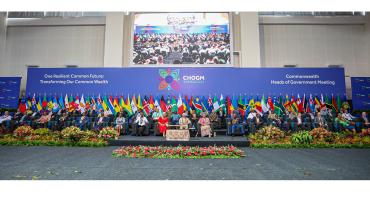Anti-slavery advocates have attended an online Commonwealth forum to share their concerns about the impact of the COVID-19 pandemic on the world's most vulnerable children.

Anti-slavery advocates have attended an online Commonwealth forum to share their concerns about the impact of the COVID-19 pandemic on the world's most vulnerable children.
The Commonwealth Secretariat’s Human Rights Unit invited leading experts to take part in the discussion on 12 June, which is designated ‘World Day Against Child Labour’.
COVID-19 and modern slavery
The forum will help inform the next report to the Human Rights Council of the UN Special Rapporteur on contemporary forms of slavery, including its causes and consequences.
The Secretariat’s senior director for Governance and Peace, Luis Franceschi, told attendees the Commonwealth is a critical stakeholder in the fight against slavery as an estimated 46 million people worldwide are trapped in conditions of modern slavery, and more than half of them are in its member states.
He said: “COVID-19 does not discriminate: it can affect anyone, anywhere. But its impact is harshest for those affected by various forms of modern slavery who were already in vulnerable situations before the crisis. While the core of the challenges we face are premised on a public health challenge, the responses must be grounded in human rights.
“The immediate priority for member states is to have strong and coherent policies with strong focus on child protection in response to the COVID-19 crisis, without discriminating against the dis-enfranchised and recognizing the inherent dignity of life in all persons across the world.”
The Commonwealth Secretariat has continued to raise its voice on this issue and has organized a series of events to spread awareness and encourage sharing of good practice among member states.
Commonwealth Heads of Government Meeting 2018
At the 2018 Commonwealth Heads of Government Meeting (CHOGM), heads called for effective measures to eradicate forced labour, end modern slavery and human trafficking, and secure the prohibition and elimination of the worst forms of child labour in all its forms by 2025, including the unlawful recruitment and use of child soldiers.
At CHOGM 2018, member countries were also encouraged to endorse the “Call to Action to End Forced Labour, Modern Slavery and Human Trafficking” presented at the 72nd Meeting of the UN General Assembly.
Prof Tomoya Obokata, UN Special Rapporteur on contemporary forms of slavery called on attendees to make submissions and contributions that would enable him to make substantive recommendations in his report to the UN Human rights Council in September.



